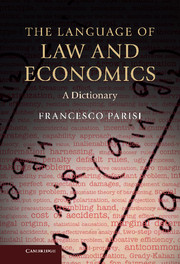F
Published online by Cambridge University Press: 04 August 2017
Summary
Fads: see herding behavior.
Fairness: see taste for fairness.
Fairness equilibrium: a Nash equilibrium in the presence of a degree of reciprocity, either positive or negative, in the objective function of the players. This equilibrium notion was introduced by Rabin (1993), who studied the role of procedural reciprocity by introducing the kindness function in the context of psychological games, a concept introduced by Geanakoplos, Pearce, and Stacchetti (1989). Psychological games are distinguished from traditional games, in that they account for beliefs as well as choices in terms of the determination of players’ motivations. The idea behind the fairness equilibrium is that beliefs regarding the actions of the other players in the game and the way in which those actions affect each individual player’s payoff play a crucial role in the definition of the equilibrium strategy. See also reciprocity, kindness function, procedural preferences, and reciprocity-induced cooperation.
False consensus bias: this describes an individual’s tendency to regard his or her own opinions as normal and to assume that others think and behave in a similar manner. Individuals who exhibit a false consensus bias tend to believe that their opinions, beliefs, and behavior are more popular and widely accepted than they are in fact. This bias leads people to overestimate the amount that others agree with them, imagining a “consensus” that is absent in reality. False consensus bias is common among overconfident individuals. See also social projection bias, self-serving bias, false uniqueness bias, and optimism bias.
- Type
- Chapter
- Information
- The Language of Law and EconomicsA Dictionary, pp. 116 - 127Publisher: Cambridge University PressPrint publication year: 2013



